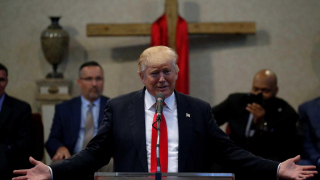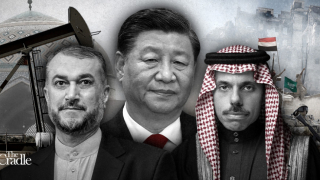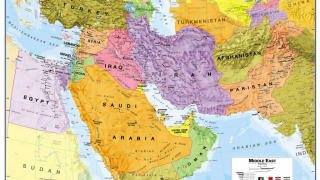Peace between the US and Iran hangs on the nuclear agreement
“An agreement must be reached, because failure to reach it is almost certain to lead to war, and in that war there will be no winners.” So writes Azeem Ibrahim, director of the Newlines Institute for Strategy and Policy in Washington, in the columns of The National Interest [1]. The scholar says that “it is imperative that President Joe Biden resurrect the deal with Iran to make sure that Tehran does not acquire nuclear weapons. The only other way to potentially stop Tehran from pursuing and achieving this goal is a real war. Which, in the aftermath of the Iraqi experience, should obviously be avoided”.
We have already had the opportunity to say recently that, despite the good will expressed by the new president Joe Biden, to resurrect the JCPOA, it will not be so easy to return within the confines of the treaty: there are structural causes, determined, for example, by 4 years of US sanctioning policy, which is not easy to cancel with a clean slate. And there are external causes represented by the position of Israel and the success of the Abrahamic Agreements that are normalizing relations between Tel Aviv and the Arab countries by increasingly isolating Iran.
“I will offer Tehran a credible path to return to diplomacy” Biden told CNN [2] last September. "If Iran were to return to strictly abide by the nuclear agreement, the United States would return to the agreement as a starting point for subsequent negotiations”. This path, however, easily - indeed, fatally - will collide with what has been said up to now and with an equally crucial issue: Tehran does not intend to put its missile program into play in the negotiations, which it considers untouchable, while on the US side - but above all Israeli - is seen as a not strictly secondary threat to be eliminated for the stability of the region.
To further complicate the situation there is the asymmetric and proxy war that has been fighting for years between Tehran, Tel Aviv and Washington itself in Syria, where the pro-Iranian militias supported directly by the IRGC (the Revolutionary Guards or Pasdaran) are not only fighting in support of the army of the government of Damascus, but also weaving a network of alliances - with Hezbollah for example - to consolidate the Iranian sphere of influence in the region, within the framework of what has been called the “Shia Crescent”, or an arc of the Middle East that goes from Iran to Lebanon via Iraq and Syria, which should fall under more or less direct Iranian control in the Ayatollahs' plans.
The latest US air raids on positions occupied by pro-Iranian militias demonstrate, once again, that behind the US opening for the return into force of the nuclear treaty (or the possible signing of a new one), the will is still to contain and downsizing the expansion of Iranian influence across the region. Israel, from this point of view, was certainly the most active actor: the bombings by the IAF (the Israeli Air Force) have followed one another almost weekly in recent months, so much so that it has also irritated Moscow, which in at least one occasion has scolded Tel Aviv, having military personnel involved in fighting in Syria.
But above all in the wake of the incident that occurred in September 2018, when an Il-20M electronic reconnaissance aircraft was accidentally shot down by Syrian anti-aircraft aircraft during an attack carried out by Israeli F-16s. Since then, Moscow and Tel Aviv have established a direct communication channel to avoid the repetition of similar incidents, but evidently the escalation of the raids worries the Kremlin and not for the survival of the Syrian regime, having always left the field open to Tel Aviv for its raids into Damascus airspace.
The limits of the 2015 agreement
Returning to the Iranian nuclear issue, the researcher rightly states that “the deal with Iran was grossly flawed, in a way that made it unsustainable from the start”, despite the huge diplomatic achievement of the Obama’s administration, namely that of having brought the Ayatollahs to the negotiating table with “the great Satan” for the first time in history. According to Ibrahim, we said, the agreement “successfully contained Iran's nuclear capacity, but left Tehran open to attack other American interests and allies in the Middle East”. A partial view, however, of him, precisely because of the neglect of the missile arsenal, the real Gordian knot of the negotiation.
We strongly doubt, in fact, that we can ever discuss the ongoing proxy conflict and the Iranian activity in support of entities such as the Houthis, who are waging a war in Yemen against Saudi Arabia and its local allies. If the Iranians have placed insurmountable stakes on their missile arsenal, defined as “untouchable”, they will certainly never openly question their plans to expand their sphere of influence, much less the United States will offer a cessation of the bombing in exchange of the withdrawal from Syria and we believe that, after all, the status quo brings a considerable advantage to Washington: it provides the pretext for continuing to have troops in the Middle East and in particular in that country where Russia is increasing its military “footprint”.
The risks of an open war
Returning to the researcher's thesis, Dr. Ibrahim believes that there is a danger that failure to reach an agreement will allow US anti-Iran “hawks” to enter the diplomatic issue to set the US on the path of direct military confrontation with Tehran. Washington, he argues, certainly has no shortage of anti-Iranian hawks who were (and are) eager to do just that. Therefore, as mentioned, he believes it is imperative for the United States to recover the agreement with Iran to ensure that Tehran does not acquire nuclear weapons; otherwise, it will be open war.
An eventuality that, in the aftermath of the Iraqi experience, should obviously be avoided: Iran is a much larger and more powerful country than Iraq, the Iranian people, even those who detest the Islamist government, would still hate more any Western intervention, and they would mobilize against the invading forces. Not to mention that Iran has forged economic and strategic ties with Russia and China, both of which would aid Tehran's war effort. War therefore would be a ruinous course of action for US interests and Washington, Ibrahim says, may not lose that war, but it is likely that it will lose the peace. As happened in Iraq and Afghanistan, we add.
The researcher also considers that, on the other side of the fence, Iran is also full of “hawks”. For this reason, Washington must make concessions, such as admitting that the Iranian people perhaps deserve some sort of compensation for the economic difficulties following the re-imposition of sanctions by the Trump administration. Basically, this is what we had identified when talking about the future of the Iranian atomic program: a sort of gradual opening on both sides to show their good will.
On the Iranian side, the heavy water reactors could be closed (i.e. those that produce plutonium immediately usable for nuclear bombs) and on the US side, it could simultaneously decide to reduce international sanctions. Who knows, therefore, if the talks currently taking place between delegates [3] from South Korea and Iran, regarding the Iranian financial assets “frozen” in Seoul, are not an attempt by the White House to “send the friend forward” to speak with the enemy?
Dr Ibrahim therefore states that in a warring war “there will be no winners” because “Washington will lose status, money, power and the lives of American soldiers, while the Islamist government of Iran will cease to exist and millions of innocent people will be got in the middle, they will suffer and die in vain”, that is a scenario that “no one can afford”.
And that is precisely why it will not happen: the United States cannot afford a campaign like Iraq's, and Iran knows that, despite being capable of inflicting heavy damage on the enemy (and its allies in the Middle East) thanks to its massive missile arsenal, the Ayatollah regime would be wiped out.
[2] https://edition.cnn.com/2020/09/13/opinions/smarter-way-to-be-tough-on-iran-joe-biden/index.html
[3] https://en.yna.co.kr/view/AEN20210316010100325
*****************************************
Original column by Paolo Mauri:
https://it.insideover.com/guerra/la-pace-tra-usa-e-iran-appesa-allaccordo-nucleare.html
Translation by Costantino Ceoldo














